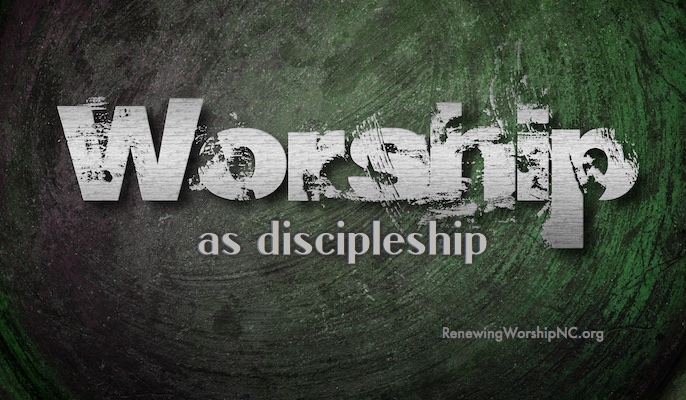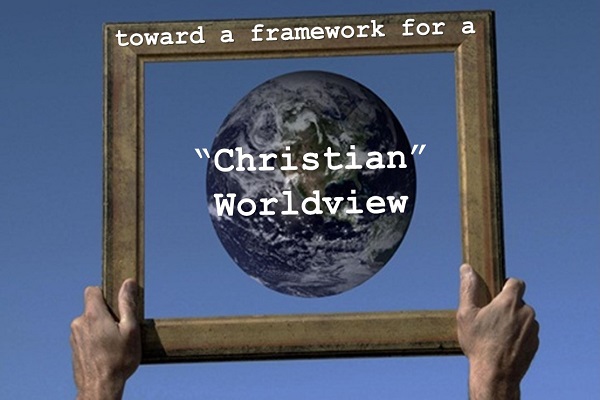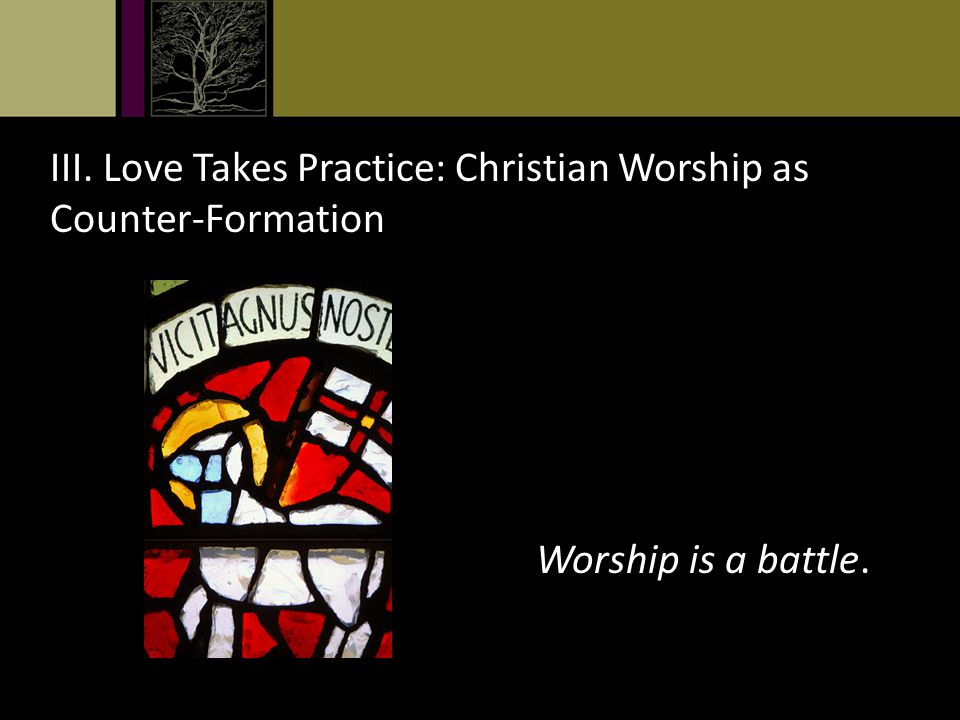세계관에서 예배로 그리고 다시 세계관으로 되돌아가기(제임스 K. A. Smith)
본고는 스미스 교수가 밴쿠버기독교 세계관대학원 (VIEW) 초청으로
2018년 2월 8일 저녁, 밴쿠버순복음교회에서 개최된 VIEW 설립 20주년 기념특강에서 강연한 원고이다.
VIEW의 전성민 교수와 서민수 목사가 영어 원고를 번역했다.


Introduction: Why Worship Is The Heart of Discipleship
서론: 왜 예배가 제자도의 중심인가
There is some irony that I would be presenting a lecture to the Vancouver Institute of Evangelical Worldview since I am known, to some, as a critic of “worldview!” In books such as Desiring the Kingdom and You Are What You Love, it’s true that I have been critical of how the term worldview is invoked. But I am not a critic of worldview per se; I am a critic of what we might call worldview-ISM, or a particularly reductionistic account of an “evangelical worldview” that I fear is too simplistic and doesn’t do justice to either our complexity as creatures or the complexity of the Gospel that animates the body of Christ. So this evening I would like to rehearse my critique of worldviewISM in order to show why an evangelical worldview needs to be (re) connected to Christian worship?why Christian culture-making needs to be centered in the liturgies of the body of Christ.

제가 밴쿠버기독교 세계관대학원에서 강연을 한다는 것은 어떤 면에서 역설적입니다. 왜냐하면 저 는 어떤 분들에게는 “세계관”을 비판하는 사람으로 알려져 있기 때문입니다. “하나님 나라를 욕망 하라(Desiring the Kingdom)”와 “사랑이 존재를 규정한다(You Are What You Love)”와 같은 책에서 저는 세계관이라는 용어가 사용되는 방식에 대해 비판했습니다. 그러나 저는 세계관 “그 자체”를 비판한 것이 아닙니다. 저는 “월드뷰이즘(worldview-ISM)” 혹은 세계관주의라고 부를 수 있는 것, 특 히 “복음주의 세계관”의 환원적인 서술에 관해 비판했습니다. 제가 우려하기에 세계관주의 또는 세 계관에 대한 환원적인 서술은 너무나 단순화된 것으로 피조물인 우리 존재의 복잡성이나 그리스도의 몸에 활기를 주는 복음의 복잡성을 정당하게 다루지 못합니다. 제가 비판하는 것은 그런 것들입니다. 그래서 저는 세계관주의에 대한 저의 비판을 통해 왜 복음주의 세계관이 기독교 예배와 (다시) 연결되 어야 하는지, 왜 그리스도인들의 문화 창조가 그리스도의 몸의 예전을 중심으로 해야 하는지 설명하 고자 합니다.
My argument begins from an anthropology, our assumptions about human persons and therefore what sorts of persons we are who think, believe, hope, love, act, and make. Every vision of Christian formation and assumes some model of the human person, even if this anthropology is never made explicit. Thus our understanding of the nature and goal of discipleship is shaped by what we think human beings are. So if you (implicitly) think that human beings are essentially thinking things?containers for ideas, beliefs, and propositions?then you will end up conceiving of discipleship as a primarily informative project: the dissemination of ideas and beliefs into mind-receptacles. And I argue that much of the rhetoric about “worldview” in Christian ministry falls into this camp: it tends to think about the nature and task of Christian discipleshiop as the dissemination of certain content, or the provision of a Christian “perspective” on how to think about the world.


제 주장은 인간론에서 시작합니다. 인간론이란 인간 존재에 대해 우리들이 가지고 있는 전제를 말 합니다. 생각하고, 믿고, 소망하고, 사랑하고, 행하고, 만드는 행위를 하는 우리들이 어떤 존재인지에 대한 전제들이 “인간론”입니다. 모든 종류의 기독교적 ‘formation’ 즉, 양육, 육성, 형성에 대한 비전은 인간에 대한 어떤 모델을 전제합니다. 설령 그러한 인간론이 전혀 명시적으로 제시되지 않아도 그렇습니다. 따라서 우리는 인간이란 무엇인가에 대한 생각에 따라 제자도의 본질과 목표를 이해 하게 됩니다. 따라서 만일 여러분이 암묵적이라도 인간이 본질적으로 생각하는 존재, 즉, 인간 사상, 신념, 명제들을 담는 상자와 같은 존재라고 생각하신다면, 여러분은 제자도를 일차적으로 정보와 관련 된 프로젝트로 여기게 될 것입니다. 그것은 사상과 신념들을 지성이라는 그릇에 보급하는 것입니다. 정보라는 영어 단어는 ‘information’인데 형성이라는 ‘formation’ 앞에 ‘~안에’라는 ‘in’ 이라는 접두사가 붙어 있습니다. 정보는 어디엔가 담아 넣을 수 있는 것입니다). 그리고 저는 기독교 사역에서 “세계관”에 관한 많은 표현들이 이런 식의 이해를 반영한다고 생각합니다. 이런 이해는 기독교 제자도의 본질과 과제가 어떤 “내용” 또는 세상에 대해 어떻게 “생각해야” 하는지에 관한 기독교적 “관점”을 제공하는 것으로 여기는 경향이 있습니다.
?
My critique is not that this is wrong but only that it is inadequate, and this inadequacy stems from the stunted anthropology that is assumed. Or, to put this in terms I first learned from the Reformational tradition, such a picture of education is insufficiently radical because it doesn’t get to the root of our identity. By focusing on the cognitive and intellectual, such a model of the person ?and its corresponding picture of formation?undervalues and underestimates the importance of the affective; by focusing on what we think and believe, such a model misses the centrality and primacy of what we love; by focusing on discipleship as the dissemination of information, we have missed the ways in which Christian discipleship is really a project of formation. In other words, at the heart of DTK’s argument is an anti-reductionism and the affirmation of a more holistic understanding of human persons and hence Christian ministry (and mission).

저는 이것이 잘못되었다고 비판하는 것이 아닙니다. 제 비판은 단지 그런 접근이 뭔가 부족하다고 불충분하다는 것입니다. 그리고 이런 불충분함은 그것이 전제하는 인간 이해 때문인데, 그것이 전제하는 인간 이해는 발육이 정지된 듯 빈약해 보입니다. 달리 말해, 제가 개혁 전통에서 처음 배웠던 개념으로 표현해 보면, 교육에 대한 그러한 그림은 충분히 “급진적” 또는 “근본적”이지 않다는 것입니다. 왜냐하면 그런 그림은 우리의 정체성의 “뿌리”에 도달하지 않기 때문입니다. 인지적이고 지성적인 것에 초점을 맞추다보니, 그러한 인간에 대한 모델은 - 그리고 그것에 상응하는 형성, 양육에 대한 그림은 - 감정 또는 정서의 중요성에 정당한 가치를 부여하지 않고 과소평가합니다. 우리가 생각하고 믿는 것에 초점을 맞추다보니, 그러한 모델은 우리가 “사랑”하는 것의 중심성과 우선성을 놓칩니다. 정보를 공급하는 것으로 제자도를 이해하다보니, 기독교 제자도가 사실은 ‘formation’ 형성에 관한 프로젝트라는 사실을 놓칩니다. 달리 말해, 책 “하나님 나라를 욕망하라”의 핵심 주장은, 인간과 그리고 기독교 사역과 선교에 대한 환원주의에 대한 반대와 인간, 사역, 선교를 좀 더 총체적으로 온전하게 이해하자는 주장입니다.
?
One of the basic problems of worldviewISM is that it can’t account for our cultural assimilation and failure to reflect the holiness to which we are called. We all experience a gap between what we know and what we do [e.g., Reading Wendell Berry in Costco], and it doesn’t seem like more or better thinking is all that’s needed to close that gap. So in many ways I’m interested in rethinking discipleship because I want a better account of our cultural assimilation and why we give in to temptation.

세계관주의, 월드뷰이즘의 기본 문제점은 그것이 우리가 문화적으로 동화되어가는 것과 우리가 부름 받은 거룩을 반영하지 못하는 이유를 제대로 설명하지 못한다는 것입니다. 우리는 모두 우리가 아는 것과 우리가 행하는 것 사이의 간격을 경험합니다. 그리고 그 간격을 메우는데 필요한 것은 그저더 많이 생각하거나 더 좋은 생각을 가지는 것이 아닌 것 같습니다. 그래서 많은 점에서 저는 제자도를 다시 생각해 보는 것에 관심이 있습니다. 왜냐하면 우리가 문화적으로 순응하고 유혹에 넘어가는이유를 더 잘 설명해보고 싶기 때문입니다.
?

I. On the Inadequacies of Worldview: A Theology of Action (and Assimilation)
세계관이라는 개념의 불충분성에 대하여: “행동”의 신학(순응의 신학)
So how might one account for this gap between my thought and my action?between my passionate intellectual assent to these ideas and my status quo action? Well, this is exactly the intuition at the heart of DTK: we might successfully convince the intellect without converting the habits of the heart. And yet so much of my action and orientation to the world is governed by dispositions that are shaped by practice. I learn to love by the practices I give myself over to.
우리의 생각과 행동의 차이, 그 간격을 어떻게 설명할 수 있을까요? 우리의 지성은 이런저런 사상들에 열정적으로 동의하지만, 우리의 행동은 현재 상태를 유지하려합니다. 이런 간격을 어떻게 설명할수 있을까요? 이제 제가 말씀드리는 것이 바로 “하나님 나라를 욕망하라”의 핵심에 있는 통찰입니다. 우리는 우리 가슴의 습관을 바꾸지 않고도 얼마든지 지성적으로 납득하고 동의할 수 있습니다. 그리고 우리의 많은 행동과 세상에 대한 지향은 여전히 “실천”에 의해 만들어지는 기질의 다스림을 받습니다. 우리는 우리의 몸을 내맡긴 “실천”을 통해 사랑하기를 배웁니다.

Implicit in the anthropology of Desiring the Kingdom is a philosophy of action?a tacit assumption about what drives or causes human behavior and action which is germane to the goal and task of Christian discipleship and mission. Our orientation to?and action in?the world is governed by preconcious habits and patterns of behavior, and those habits are formed by environments of practice. As such, we should be increasingly attentive to the formative role of environment and practice in shaping our desires. Moreover, we do not become assimilated to the dominant culture because we are convinced by bad ideas and false messages. Rather, our assimilation is the result of our naivete about the (de)formative power of “secular liturgies,” cultural rituals that are shaping the habits of our hearts.
?
책 <하나님 나라를 욕망하라>에 담긴 암묵적인 인간 이해는 바로 행동에 관한 철학입니다. 인간 행동에 대한 철학이라는 것은 무엇이 인간 행위와 행동을 추동하는가, 또는 인간 행위와 행동의 원인이 되는가에 대한 암묵적인 전제들을 말합니다. 그것들은 기독교 제자도와 선교의 목적과 과제와 밀접한 관계가 있습니다. 세상에 대한 우리의 지향, 그리고 세상 속에서의 우리의 행동은 의식 이전의 습관들과 행위의 패턴들의 다스림을 받습니다. 그리고 그런 습관들은 실천의 “환경”에 의해 형성됩니다. 우리는 우리의 욕망을 형성하는데 환경과 실천이 어떤 역할을 하는지에 대해 좀 더 많이 주의를 기울어야만 합니다. 더욱이 우리가 주류 문화에 순응하고 동화되는 것은 우리가 잘못된 사상과 거짓 메시지들에 설득되었기 때문이 아닙니다. 오히려 우리가 그렇게 순응하고 동화되는 것은 “세속적인 예전들”의 형성적인 또는 왜곡시키는 힘에 대해 우리가 순진하게 생각한 결과입니다.

[Could explain MALL example here; or smartphone]3)
이것은 또한 “문화적 예전들(cultural liturgies)”이라고 할 수 있습니다. 우리의 마음과 가슴에 습관들을 형성시키는 것은 그러한 문화적 예전들입니다. 문화적 예전들이 무엇인지 “소비주의”와“쇼핑몰”의 예를 통해 설명해보겠습니다. 우리는 어떻게 소비주의에 물든 사람이 됩니까? 우리는 어떻게 소비주의라는 거짓 복음에 넘어가게 되는 것인가요? 다른 사람들의 “생각”에 설득되었기 때문에 소비주의자가 되는 것은 아닙니다. 만일 여러분은 ‘물질이 당신을 행복하게 만들어 줄 것’이라는 소비주의에 관한 거짓 메시지를 들었다면, 즉각적으로 그것은 바보 같은 생각이라고 말할 것입니다. 그런데 문제는, 우리는 그것이 잘못된 생각이라는 것을 알고 있음에도 불구하고, 또 다시 소비주의에 빠져들고 만다는 사실입니다. 왜냐하면 소비주의가 우리의 “생각”을 바꾸기 때문이 아니라, 우리의 “마음”을 포로로 사로잡기 때문입니다. 저의 자녀들이 십대였을 때, 아이들은 쇼핑몰에 가고 싶어 했습니다. 그 때, 아이들은 제게 말했습니다. “아빠, 저를 성전(temple)에 좀 데려다 주시겠어요?” 왜 그들은 쇼핑몰을 성전이라고 표현했을까요? 왜냐하면 저는 자녀들에게 쇼핑몰은 또 하나의 종교적 성전이라고 가르쳐줬었기 때문입니다. 그것은 쇼핑몰이 하나의 신학을 가지고 있기 때문에 종교적 성전이라는 의미가 아니라, 그것 나름대로의 예전을 갖고 있기 때문에 종교적 성전이라고 말했던 것입니다. 쇼핑몰은 나름대로의 예전을 갖고 있습니다. 인간의 삶이 어떠한 모습인지를 그려주는 예전들입니다. 그런 예전들은 우리의 지성을 그냥 통과해버립니다. 그리고 우리의 가슴에 곧바로 도달해버립니다. 쇼핑몰은 우리가 그저 방문하는 장소가 아니라, 우리에게 어떤 영향을 미치는 장소입니다. 쇼핑몰은 우리가 무언가를 원하도록 만듭니다. 하나님을 대신하는 무언가를 원하도록 만들어버립니다. 다른 말로 하면, 우리는 실천을 통해 그 우상숭배로 조금씩 빠져들게 됩니다. 우리들의 우상숭배는 잘못된 생각들에 설득되었기 때문에 행하게 되는 경우가 별로 없습니다. 오히려 우리의 우상숭배는 경쟁적인 예전들이 우리들의 가슴을 사로잡기 때문에 우리로 하여금 우상숭배 하도록 만드는 것입니다. 스마트폰(Smartphone) 역시 하나의 문화적 예전이라고 말할 수 있습니다. 스마트폰은 우리가 무엇을 사랑하는지 알려주는 또 다른 예전의 예가 될 것입니다. 이런 상황에 대한 응답은 사람들에게 더 “많은 세계관”을 갖도록 하는 일이 아닙니다.

The response to such a situation is not simply pressing people to think more about what they’re doing. Consider an everyday example: eating. In his book Mindless Eating, Cornell nutritionist Brian Wansink accounts for the American obesity epidemic in terms of the habits and practices which unconsciously shape our tastes and eating patterns.4) We are trained to orient ourselves to food and food systems by practices and environments which shape our orientation at a preconscious level?and then we regularly act on the basis of those malformed desires. We eat “mindlessly.” However, what’s most significant is Wansink’s antidote to this problem: it is not a matter of mindful eating. Drawing on extensive psychological research, Wansink demonstrates that we simply are not the sorts of animals who can be deliberatively “on” all the time. So the proper response to unhealthy mindless eating is not mindful eating but rather healthy mindless eating, changing environments and practices in order to form different (unconscious) habits.
또한 이런 상황에 대한 응답은, 사람들로 하여금 그들의 행동에 대해 더 “많이 생각”하도록 요구하는 것이 아닙니다. 일상의 예를 생각해 봅시다. 음식을 먹는 것, 식사에 대해 생각해 봅시다. “생각없는 먹기(Mindless Eating)”라는 책에서 코넬 대학의 영양학자 브라이언 완싱크(Brian Wansink)는 미국 사람들 사이에 만연한 비만 문제를 설명합니다.5) 그런데 그는 우리의 입맛과 음식 먹는 패턴을 무의식적으로 형성하는 습관과 실천의 관점에서 설명합니다. 우리가 어떤 음식과 음식 시스템에 향하게되는지는 의식 이전의 층위를 형성하는 실천들과 환경들에 의해 훈련됩니다. 그리고 우리는 그렇게 잘못 형성된 욕망에 토대해 정기적으로 반복되는 행동을 합니다. 우리는 “생각 없이(mindlessly)” 먹는 것입니다. 그런데 가장 의미심장한 것은 이런 문제점에 대한 완싱크의 해결책입니다. 생각 없이 먹는 것에 대한 해결책이 “생각하며” 먹는 것(mindful eating)이 아니라는 것이 가장 의미심장합니다. 광범위한 심리학 연구 결과를 통해 완싱크는 우리가 “항상” 의식적으로 생각하며 살아가는 식의 존재가 아니라는 것을 보여줍니다. 그렇기 때문에 건강에 좋지 않은 생각 없는 음식 먹기에 대한 적절한 제대로 된 응답은 “생각하며” 먹는 것이 아니라, 생각 없이 음식을 먹되 그것이 “건강에 좋은 것”이어야 한다는 것입니다. 이것은 또 다른 (무의식적인) 습관을 형성하기 위해 환경과 실천을 바꾸는 것입니다.


A “worldview approach” would assume that the proper response to mindless eating is mindful eating. Similarly, an “intellectualist” model of discipleship would assume that the proper response to the unconscious deformation of “secular liturgies” would be “critical reflection,” thinking about it more, thinking about what we’re doing. Of course such reflection and thinking is important and crucial; and the articulation of a Christian worldview is helpful?but we’ve all done things we know we should not. You can be intellectually convinced that spinach is good for you but still choose chocolate cake in the cafeteria. You can’t think your way to holiness.
“세계관적 접근”은 아마도 생각 없는 식사에 대한 적절한 응답은 “생각하는” 식사라고 여길 것입니다. 마찬가지로 제자도에 대한 “지성주의” 모델은 “세속적 예전들”의 무의식적인 해체, 변형, 왜곡에 대한 적절한 응답은 “비평적 성찰”, 즉 우리의 행동에 대해 더 많이 생각하는 것이라고 여길 것입니다. 당연히 그러한 성찰과 사고는 결정적으로 중요합니다. 그리고 기독교 세계관을 잘 설명하고 표현하는 것은 도움이 됩니다. 그러나 우리 모두는 해서는 안 된다고 “알고” 있는 것들을 실제로는 “행해”왔습니다. 여러분은 지성적으로 시금치가 몸에 좋다고 설득될 수 있습니다. 그러나 여전히 식당에서 초콜릿 케이크를 고르시겠죠. “생각”한다고 해서 거룩에 이르는 길을 가고 있는 것이 아닙니다. 생각으로는 거룩에 관한 길을 걸어갈 수 없습니다.

My argument is not that we need less than worldview, but more: spiritual renewal requires not only retooling our worldview but the reformation of our habits. And such formation happens not only, or even primarily, by equipping the intellect but through the repetitive formation of embodied, communal practices. And I would emphasize that the “core” practices in this respect are specifically the practices of Christian worship. But before turning to a consideration of the role of worship in Christian formation, let me address a second concern: the worry that my argument signals a retreat back into anti-intellectual pietism.
제가 지금 “우리는 세계관이 필요 없다” 또는 “세계관까지는 필요 없다”고 주장하는 것이 아닙니다. 제 주장은, “우리에게 필요한 것은 세계관 그 이상이다” 또는 “세계관 뿐 아니라 무엇인가 더 필요하다는 것입니다.” 영적 갱신에 필요한 것은 우리의 세계관을 재조직하는 것이 아니라 우리의 “습관”을 갱신 - 다시 형성 하는 것입니다. 그러한 형성이 벌어지는 것은 지성을 구비하는 것뿐 아니라 반복적으로 몸에 익히는 공동체적 실천을 통해서입니다. 지성을 구비하는 것이 심지어 일차적인 것도 아닙니다. 여기에 저는 이런 측면의 “핵심” 실천은 특히 기독교 예배라는 실천이라는 것을 강조하고자 합니다. 하지만 기독교적 형성에 있어 예배의 역할을 살피기 전에 제가 가지고 있는 두 번째 우려를 이야기하고 싶습니다. 그것은 제 주장이 반지성주의적 경건주의로 물러서자는 뉘앙스를 주지는 않나하는 걱정입니다.

Anti-intellectualism - Wikipedia
Anti-intellectualism From Wikipedia, the free encyclopedia Not to be confused with opposition to moral intellectualism . This article needs additional citations for verification . Please help improve this article by adding citations to reliable sources . Unsourced material may be challenged and remo...
en.wikipedia.org
II. A Hearts and Minds Strategy: On Anti-intellectualism
감성과 지성 모두를 다루는 전략: 반지성주의에 대하여
Granted, in DTK I basically argue that discussions of Christian discipleship overestimate the importance of thinking. This is generally not a good strategy for trying to win friends and influence people when the people involved consider themselves thinkers. Furthermore, many would be quite surprised to hear that thinking is being overvalued in North American evangelicalism. Indeed, quite the opposite seems to be true: evangelical piety tends to intensify a general anti-intellectual malaise that besets our culture. The response to such a situation would be to encourage more thinking, not less?to emphasize the importance of the mind, not fall back into the soppy mushiness of “the heart” and its affections. In short, by criticizing “rationalist” or “intellectualist” models of the human person, it would seem that I’m plays right into the hands of the forces of anti-intellectualism6

<하나님 나라를 욕망하라>에서 저는 기본적으로 기독교 제자도에 대한 논의들이 사고와 생각의 중요성을 과대평가했다고 주장했습니다. 이것은 일반적으로 관련된 사람들이 자신들을 “사상가”, “생각 좀 하는 사람들”이라고 여길 때 그런 친구들을 설득하고 그들에게 영향을 주기에 좋은 전략은 아닙니다. 더욱이 많은 사람들은 북미 복음주의에서 “사고”, “생각하기”의 가치가 과대평가 받고 있다는 이야기를 들을 때면 꽤 놀랄 것입니다. 실제로는 그 반대 상황인 것으로 보입니다. 복음주의 경건은, 우리 문화를 괴롭히는 반지성주의의 불편한 증상을 강화시키는 경향이 있습니다. 이런 상황에 대한 응답은 “지성”의 중요성을 강조하고 “마음”과 정서, 눈물 많은 감상에 빠지게 하지 않기 위해, 생각을 덜 하자는 것이 아니라 “더 많이” 생각하고 사고하자고 격려하는 일일 것입니다. 요컨대 인간에 대한 “이성주의” 또는 “지성주의” 모델을 비판하는 것을 통해 내가 반지성주의의 힘에 놀아나는 것처럼 보일 수 있겠습니다.7)
[7) “반지성주의”라는 비판을 받는 것은 이상한 일입니다. 왜냐하면 저는 “하나님 나라를 욕망하라”의 첫 페이지에서 반지성주의를 분명하게 거절하고 있으며, 책 자체 역시 그런 식으로 전개되지 않기 때문입니다. 책의 전체 주장은 교육에 관한 독특하고 온전한 기독교 관점을 표현하기 위해 다양한 사상들을 소개하고 있습니다. 이를테면 독자들로 하여금 '하이데거','아우구스티누스', '테일러', 부르디' 등의 복잡한 이론들을 통해 사고하도록 이끌고 있습니다. 만일 본서에 관한 반지성주의라는 평가가 옳다면, 당신은 제가 왜 그러한 설명들을 하고 있는지 의아해할 것입니다. 아마도 그 점이 본서에 대한 반지성주의라는 평가가 정당하지 않다는 것을 보여주는 단서가 될 것입니다.]

But such worries stem from a misunderstanding of my emphasis on worship with respect to worldview.8) My goal is not to denigrate the intellect but to situate theological reflection within the wider purview of our fundamental pre-theoretical orientation to the world.9) From this some too hastily conclude that relativizing the intellectual is somehow a rejection of the intellectual, but that clearly doesn’t follow. I am pressing us to consider the significance of our non- and pre-intellectual orientation of the world; to appreciate all of the ways in which this shapes and governs our being in the world; and to therefore expand what we consider as falling within the purview of discipleship and sanctification. To situate (and relativize) the intellect is not anti-intellectual; it is emphasizing that even rationality needs to be faithful, needs to be disciplined and trained. And this seems to be a deeply biblical sensibility. Indeed, Paul’s prayer for the Christians in Philippi could easily be the epigraph of DTK:

그러나 그러한 우려는 세계관과 관련해 제가 예배를 강조하는 목적에 대한 오해에 기인합니다.10) 나의 목적은 지성을 폄훼하는 것이 아니라, 세상에 대한 우리의 근본적이고 전이론적 지향 (pre-theoretical orientation)이라는 좀 더 넓은 시야 안에 신학적 성찰을 자리 잡게 하는 것입니다.11) 이런 것에 근거해 어떤 분들은 성급하게 지성을 “상대화”하는 것이 어떤 식이든지 지성을 거부하고 배제하는 것이라고 결론 내립니다. 그러나 분명히 그런 결론이 논리적으로 자연스러운 것은 아닙니다. 저는 세상에 대해 우리가 가지고 있는 지성적이지 않은, 그리고 지성 이전 단계의 지향이 중요함을 고찰하자고 요구하는 것입니다. 세상 안에서, 우리의 존재를 형성하고 다스리는 모든 방식들을 깊이 잘 이해해야 한다고 요구하는 것입니다. 따라서 제자도와 성화의 범위 안에 들어간다고 여기는 것을 확장하자고 요구하는 것입니다. 지성의 위치를 찾아주고 또 지성을 상대화하는 것은 반지성주의가 아닙니다. 그것은 합리성이 “신실해야”한다고, 합리성이 훈육되고 훈려되어야 할 필요가 있다고 강조하는 것입니다. 그리고 이것은 성경에 뿌리를 둔 이해입니다. 그런 의미에서 빌립보 기독교인들을 위한 바울의 기도는 진정 “하나님 나라를 욕망하라”의 권두언이 될 수 있습니다.
[9) And this I pray, that your love may abound still more and more in real knowledge and all discernment, 10 so that you may determine what really matters… (Phi. 1:9-10, NASB, revised). 9 내가 기도하노라 너희 사랑을 지식과 모든 총명으로 점점 더 풍성하게 하사 10 너희로 “지극히 선한 것”을 분별하며… (빌립보서 1:9-10)]
[10) 제가 예배와 세계관의 관계에 있어 그것들이 둘로 대립적으로 분리된 것 같은 인상을 주는 강한 주장을 하고 있다는 것을 인정합니다. 그러나 저는 제가 이미 설명한 이유들 때문에 제가 그런 이분법적인 관계를 실제로 만들고 있다고는 생각하지 않습니다.]
[11) 이 점에 있어서, 저의 주장은 Charles Taylor와 Alasdair MacInytre의 책 “Dependent, Rational Animals”에 꽤 많은 빚을 지고 있습니다.]

Our knowledge and discernment is guided and shaped by our loves. And love takes practice. Formation operates on this pre-theoretical register whether we recognize it or not. Pedagogies of desire form our habits, affections, and imaginations, thus shaping and priming our very orientation to the world. So if a Christian ministry is going to be holistic and formative, it needs to attend to much more than the intellect?which is why I emphasize that there is a unique “understanding” that is “carried” in Christian practices, particularly the practices of Christian worship. It is in such practices that our love is “trained,” disciplined, shaped and formed. And it is, to some extent, only in such practices that this can happen.12)
우리의 지식과 분별은 우리의 사랑을 통해 인도받고 형성됩니다. 그리고 사랑은 훈련적 실천을 실행합니다. 형성은 우리가 인식하건 못하건 이러한 이론 이전의 수준에서 작동합니다. 욕망의 교육은 우리의 습관, 정서, 상상들을 형성합니다. 그렇기에 욕망의 교육은 우리가 세상을 어떻게 바라보느냐를 형성하고 세상에 대한 예비지식을 줍니다. 따라서 만일 기독교 사역이 총체적이고 형성적이 되려면 기독교 사역은 지성 뿐 아니라, 즉, 지성 보다 더 많은 것에 주의를 기울여야 합니다. 이것이 제가 기독교적 실천, 특히 기독교 예배라는 실천 속에서 “담겨 실행되어야”하는 독특한 “이해”가 있다고 강조하는 이유입니다. 우리의 사랑이 “훈련되고”, 훈육되고, 형성되고, 만들어지는 것은 그러한실천 속에서 입니다. 그리고 어느 정도는 그러한 실천 속“에서만” 그런 일이 벌어질 수 있습니다.13) 여러분에게 제차 제안하고 싶은 것은, 과연 우리의 예배가 쇼핑몰에서 경험하는 예전의 대항 (counter)이 될 수 있겠는가 하는 점입니다.
기독교의 예배는 세상의 예전에 대한 대항적 형성(counter formation)이 될 수 있어야 합니다.


III. Taking Worldview (Back) to Church
세계관을 교회로 다시 가져가기
A holistic, formative Christian education will not only equip believers with a Christian perspective; it must also form them through Christian practice?for only practiced formation will adequately capture our imaginations and convert our habits such that our orientation and action in the world is aimed at the shalom God desires for his creation.14) This means that churches (and schools and colleges) must not only be informed by a Christian worldview; they must also be nourished by Christian worship, for it is the historic, intentional, communal practices of Christian worship which “carry” a formative, liturgical “understanding” of God’s redemptive good news.15) And this “know-how” cannot be paraphrased; it cannot be adequately translated into the portability of propositions. It can only be absorbed through practice.
총체적이고 형성적인 기독교 교육은 신자들에게 기독교적 관점만 구비시키지 않을 것입니다. 총체적이고 형성적인 기독교 교육은 또한 기독교적 실천을 통해 신자들을 양육하고 형성해야만 합니다. 왜냐하면 실천된 형성만이 우리의 상상을 적절하게 포착하고 포획할 수 있습니다. 우리의 습관을 바꿀 수 있습니다. 그래서 우리가 세상에서 무엇을 바라보고 어떻게 행동하는가를 바꿔낼 수 있습니다. 그렇게 바뀐 우리의 지향은 피조세계를 향한 하나님이 바라시는 샬롬을 목표할 수 있게 될 것입니다.16) 이것은 교회들 (그리고 학교들과 대학들은) 기독교 세계관에 대해 배워야 할 뿐 아니라 기독교 “예배”에 의해 영양 공급을 받아야 한다는 것을 의미합니다. 왜냐하면 하나님의 구속의 좋은 소식에 대한 형성적이고 예전적인 “이해”를 “담고 실행하는”것은 기독교 예배라는 총체적이고, 의도적이고, 공동체적인 실천이기 때문입니다.17) 그리고 이러한 “노하우(know-how)”는 풀어서 표현할 수가 없습니다. 그것은 휴대해서 이동하기 쉬운 명제들로 적절하게 번역될 수 없습니다. 오직 실천을 통해 몸에 흡수될 수밖에 없습니다.
[16) 아마도 교육 기관만이 이런 일을 하는 것이 아니라는 점을 분명히 밝혀야 할 것 같습니다. 어떤 면에서 모든 기독교 단체는 기독교 세계관에 의해 가르침 받고 기독교 실천에 의해 형성되는 정도 내에서 총체적으로 기독교인들이 될 것입니다.]

“허클베리 핀의 모험”의 저자 마크 트웨인(Mark Twain, 1835-1910)은 다음과 같이 말했습니다. “고양이의 꼬리를 잡고 운반하는 사람은 다른 방식으로 배울 수 없는 것을 배우게 된다(If he carries a cat by the tail he learn something he cannot learn no other way).” 여러분은 무언가를 실천함으로서 배우는 것입니다. 다른 방식으로 전혀 배울 수 없는 것을 행함으로서 배우게 됩니다. 그것이 기독교의 예배가 의미하는 방식입니다. 우리가 복음을 배우는 것은 예배(실천)를 통해 배웁니다. 강의를 통해 배울 수 없는 것을 예배를 통해 배웁니다. 이것은 사로잡히는 것이지 가르침을 받는 것이 아닙니다.
On this account, Christian worship (and other related Christian practices18)) is not only beneficial to the task of Christian discipleship, it is essential. Indeed, worship is the heart of discipleship. Through the practices of Christian worship we acquire a tacit know-how that shapes our action, including our intellectual activity. These practices are meant to form us as a people who desire the Kingdom and who embody a foretaste of that coming kingdom. Before we ever articulate a Christian worldview, we absorb a visceral understanding of God’s kingdom in the practice of Christian worship. If we believe in order to understand, you might say we worship in order to worldview.

이런 이유로, 기독교 예배 (그리고 관련된 다른 기독교적 실천들19)은 기독교 제자도에 유익할 뿐 아니라, 필수적입니다. 참으로 예배는 제자도의 핵심입니다. 기독교 예배라는 실천을 통해 우리는 우리의 지성 활동을 포함한 우리 행동의 모습을 형성하는 암묵적 노하우들을 익히게 됩니다. 이런 실천들은 우리를 하나님의 나라를 욕망하는 사람들로, 앞으로 임할 하나님 나라를 미리 맛보는 것을 구체화하는 사람들로 형성하는 목적이 있습니다. 우리가 기독교 세계관을 설명하고 표현하기 전에 우리는 기독교 예배라는 실천 속에서 하나님의 나라를 오장육부를 통해 우리 존재 깊숙이 받아들입니다. 만일 우리가 이해하기 위해 믿는다고 말할 수 있다면, 우리는 세계관을 가지기 위해 예배한다고 말할 수도 있을 것입니다.

This means we need to reconnect worldview to the church. Too often worldview-ism turns Christianity into an abstract intellectual system, a body of beliefs, that is untethered from the concrete practices of the body of Christ and the institutional expression of the church in real, local congregations. I believe Abraham Kuyper can help us think through the connection between worship and worldview, church and culture, in his helpful distinction between the church as “institute” and the church as “organism” and, more importantly, in his account of how the two are related.
이것은 우리가 세계관을 “교회”와 다시 연결해야 한다는 것을 의미합니다. 너무나 자주 월드뷰이즘, 세계관주의는 기독교를 현실 교회, 지역 회중의 제도적 표현과 그리스도의 몸의 구체적인 실천들과 연결되지 않은 추상적인 지성의 체계, 신념의 덩어리로 만들어 버립니다. 저는 아브라함 카이퍼(Abraham Kuyper, 1837-1920)가 예배와 세계관, 교회와 문화의 연결점에 대해 우리가 숙고하는 것을 도와줄 수 있다고 믿습니다. 그는 “제도”로서의 교회와 “유기체”로서의 교회를 구별했는데, 이 구별은 도움이 됩니다. 그리고 더 중요한 것은 그는 이 두 종류의 교회가 어떻게 “관련”되는지에 대해 설명했습니다. 이런 카이퍼의 구별과 설명이 도움이 됩니다.
Kuyper has an important account of how the church can be a leavening effect on the culture; but it can only have that effect if the church is centered in Christ. So the church does two things, he points out: “(1) it works directly for the well-being of the elect, lures them to conversion, comforts, edifies, unites, and sanctifies them; but (2) it works indirectly for the well-being of the whole of civil society, constraining it to civic virtue” (189-190). So the church is called to have a “leavening” effect on society, impacting all the spheres of human cultural production. Thus Kuyper distinguishes between the church as “institute” and the church as “organism.” The church as institute should be a “city on a hill amid civil society” (190) and from which the church as organism infiltrates and leavens civil society. As he’ll later put it, “[t]his institute does not cover everything that is Christian. Though the lamp of the Christian religion only burns within that institute’s walls, its light shines out through its windows to areas far beyond, illumining all the sectors and associations that appear across the wide range of human life and activity” (194). Thus he suggests that we picture these as concentric circles, with the church as institute?preaching the Word, administering the sacraments, exercising discipline, forming disciples?nourishing a vibrant core of believers who, as an organism, infiltrate and leaven civil society (194-195).20)

카이퍼는 교회가 어떻게 문화에 감화력, 누룩 효과를 줄 수 있는지 중요한 설명을 했습니다. 그런데 교회가 그리스도를 중심으로 할 때에만 감화와 영향을 줄 수 있습니다. 그래서 교회는 두 가지를 행한다고 카이퍼는 지적합니다. (1) 교회는 선택받은 자들의 안녕(the well-being)을 위해 “직접적으로” 일합니다. 그들을 회심으로 이끌고, 평안케 하고, 교화하고, 연합하고, 성화시킵니다. 그러나 (2) 교회는 시민 사회를 시민적 덕 가운데 지속되게 함으로써 전체 시민 사회의 안녕을 위해서 “간접적으로” 일합니다. 따라서 교회는 인간 문화 창조의 모든 영역에 영향을 미치며 사회에 “감화”를 주는 효과, “누룩 효과”를 가져오도록 부름 받았습니다. 따라서 카이퍼는 “제도”로서의 교회와 “유기체”로서의 교회를 구별합니다. “제도”로서의 교회는 “시민 사회 속에서 산 위에 있는 동네”(190)가 되어야 합니다. 그리고 그것으로부터 시작해 “유기체”로서의 교회는 시민 사회에 스며들고 변화를 일으킵니다.21) 카이퍼가 후에 말했습니다. “이 기관, 제도는 기독교적인 모든 것을 다 포함하지 않는다. 기독교 종교의 등잔불은 오직 이 제도의 담장 안에서만 타오르지만, 그것의 빛은 그 제도의 창문을 통해 훨씬 더 멀리까지 비춘다. 인간 삶과 활동의 넓은 범위를 가로지르는 모든 영역과 조직들에 빛을 비춘다”(194). 따라서 카이퍼는 우리가 이것을 동심원으로 그려보기를 제안합니다. 그 그림에서 말씀을 설교하고, 성례를 집전하고, 권징을 행하고, 제자들을 만들어내는 제도로서의 교회는 그 원의 중심에 위치한 생명력 넘치는 신자들을 양육하는데, 그들은 유기체로서 시민사회에 누룩처럼 스며들어 변화를 일으킵니다(194-195).
[21) 개신교의 번영 방식에 있어서, 카이퍼는 유기체로서의 교회는 조직체로서의 교회보다 앞서며, 심지어 조직체로서의 교회가 그 기능을 멈춘 곳에서도 (유기체로서의 교회는) "그 모습을 드러낼" 수도 있다고 주장합니다.]

Now, what does this have to do with our concern?specifically, the relationship between worship and worldview? Well, what’s at stake here is not only how we make the distinction between the two, but how we understand the relation between the two. So while Kuyper certainly emphasizes that “the institute does not cover everything that is Christian” (194), he goes on to note, recalling the concentric circle metaphor: “Aside from this first circle of the institute and in necessary connection with it, we thus recognize another circle whose circumference is determined by the length of the ray that shines out from the church institute over the life of people and nation” (195). It seems to me that it is precisely Kuyper’s claim that there is a necessary connection between institute and organism that has been lost in certain strains of Kuyperianism. And why does Kuyper propose a necessary connection between the two? Precisely because it is the worship of the church as institute which forms those who will be the rays of light in civil society. It is our reformation in worship that enables us to be a light to the world.
?

자, 이제, 이것이 우리의 관심사, 특히 예배와 세계관의 관계와 무슨 상관이 있을까요? 여기 문제가 되는 것은 우리가 예배와 세계관을 어떻게 구별하느냐 뿐 아니라 그 둘 사이의 “관계”를 우리가 어 떻게 이해하느냐 입니다. 그래서 카이퍼가 분명 “그 제도가 기독교적인 모든 것을 포함하지 않는다”(194)고 말했음에도 동심원 은유를 상기키시며 이어서 이렇게 말합니다. “우리는 제도로서의 교 회를 보여주는 첫 번째 원과는 별개로, 그리고 그것과 필연적으로 연결된 또 다른 원을 인식한다. 그 원의 둘레는 제도 교회로부터 발현되 나와 사람들과 나라의 삶 위에 비치는 빛줄기의 길이가 결정한다. 그런데 제도로서의 교회와 유기체로서의 교회 사이에 “필수적인 연결”이 있다는 카이퍼의 바로 그 주장을 어떤 카이퍼주의의 계통은 잃어버린 것처럼 보입니다. 그러면 카이퍼는 왜 그 둘 사이의 필연적 연결을 제안했을까요? 그것은 바로 제도로서의 교회의 예배가 시민 사회 속에 비추는 빛줄기가 될 사람을 형성하기 때문입니다. 예배 가운데 우리가 다시 형성되는 것이 우리로 하여금 세상의 빛이 될 수 있게 합니다.

'신앙 및 신앙 서적 ' 카테고리의 다른 글
| 리더십, 빌 하이벨스 외 (0) | 2021.01.09 |
|---|---|
| 거인들의 발자국 by 한 홍 (0) | 2021.01.09 |
| 단테의 <신곡> (0) | 2021.01.08 |
| 베드로 전서 QT (0) | 2021.01.03 |
| 거룩한 전쟁- 존 번연 (0) | 2020.12.23 |



